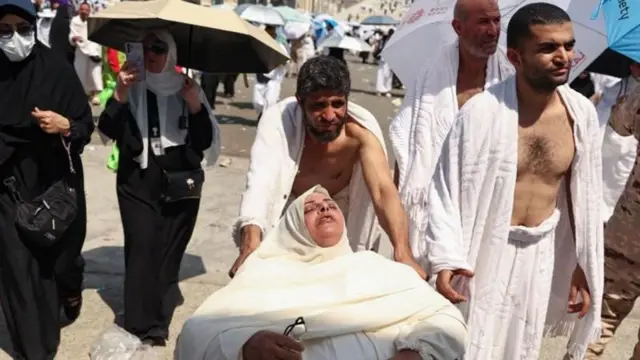Every Muslim wants to perform Hajj at least once in his life. But only 2 million Muslims can perform Hajj every year.
The Saudi Arabian government reported that about 1.8 million people performed Hajj this year.
However, these 1.8 million people are only those who have performed Hajj according to the official Hajj system prescribed by the Saudi authorities. Those who performed Hajj in violation of this rule are not included in this figure.
More than 1300 people have died while performing Hajj in Saudi Arabia this year. Most of those who died suffered from heatstroke as temperatures exceeded 51 degrees Celsius.
According to the news agency AFP, more than half of the dead were 'unregistered' pilgrims, who had attended the Haj by 'illegal means'.
They could not avail facilities like air-conditioned tents and air-conditioned buses.
Here the question arises, why some people are forced to adopt illegal methods to fulfill their religious duties?
What are these illegal methods and those who choose these illegal methods while performing their religious duties are deprived of any benefits during Hajj?
According to the news agency AFP, more than half of the dead were 'unregistered' pilgrims, who had attended the Haj by 'illegal means'.
They could not avail facilities like air-conditioned tents and air-conditioned buses.
Here the question arises, why some people are forced to adopt illegal methods to fulfill their religious duties?
What are these illegal methods and those who choose these illegal methods while performing their religious duties are deprived of any benefits during Hajj?
Legally, two million people are allowed to perform Hajj annually, but millions more come to perform Hajj illegally
How is Hajj possible on Umrah or Tourist Visa?
Professor Sajjad Qamar, adviser to Pakistan's Ministry of Religious Affairs, told the BBC's Sana Asif that many people perform Hajj on Umrah or tourist visas, which is an illegal means.
"The Saudi government allows Umrah on a visit visa and many do, but Hajj is not allowed on a visit visa and the Saudi government specifically prohibits it," he said.
Professor Sajjad Qamar explained that "During the months of Zilqad and Zilhajj, a foreigner is not allowed to land at Jeddah Airport if he comes to Saudi Arabia on a visit tourist visa."
"Those who come on visit visa during these two months can go to Medina, Munawara, Riyadh and Dammam airports."
Prof. Sajjad said, "Those who do not have Hajj permit and those who have come on visit visa, reach the Hajj site through different cities and join some Hajj groups."
Air-conditioned tents are available to rest on valid routes.
Prof. Sajjad said, "Those who do not have Hajj permit and those who have come on visit visa, reach the Hajj site through different cities and join some Hajj groups."
For example, if one leaves from the city of Karachi in Pakistan, he reaches Madinah, Taif or other cities without wearing Ihram and joins Hajj.
What facilities are deprived of 'illegal' pilgrims?
According to Professor Sajjad Qamar, a person cannot be registered anywhere without a Hajj permit.
"They are not part of a government project, they are not part of a private Hajj group, so they arrange everything themselves, like getting to Makkah and then arranging accommodation there."
According to him, the pilgrims who come this way do not get any facilities (accommodation, food, transport) anywhere in Mina, Muzdalifa, Mushaira and Arafat.
Where a registered pilgrim gets various benefits. Because the Saudi government makes all the arrangements for the registered pilgrims in these places.
Professor Sajjad Qamar also said, "Some people can get a place in the tents because of their acquaintances and relations, but there are many pilgrims who have no access to these tents."
There is very little space inside a tent, so there is no extra room for an extra person.
Due to this, people who go by illegal means keep roaming on the roads. They are the ones who are affected by adverse weather especially extreme heat and get sick, as it happened this time.
According to Prof. Sajjad Qamar, this is not a new thing but it is happening often, it has been happening for many years and the number of pilgrims coming through illegal means is very high. This time due to the heat, the issue has come to the fore again.

What is the reason for performing Hajj illegally?
As the BBC Arabic section reports, there are many reasons why some people choose this illegal route, the most notable of which are money and age.
Due to the high cost of Hajj, many are encouraged to perform Hajj without government permission.
It may be noted that in 2020, the government collected about five lakh rupees per person from people coming from Pakistan to perform Hajj, which increased to seven lakh ten thousand rupees in 2022 and increased to Rs 1.2 lakh in 2023.
According to Egypt's National Foundation for Hajj Facilitation, the cheapest Hajj program costs 191,000 Egyptian pounds, or about 4,000 US dollars, while the cheapest package for Hajj by plane is 226,000 Egyptian pounds.
The Hajj fee in Jordan costs about 3,000 dinars, which is equivalent to four thousand two hundred US dollars, while it costs about one thousand dinars (about $1,400) to 'smuggle' a pilgrim with a visit visa. Sometimes it costs as much as two thousand dinars or about $2,800.
On the other hand, the cost of Hajj by official means from Jordan is about 3 thousand 90 dinars. In addition, if you go by flight and stay in a five-star hotel located within 500 meters of the courtyard of the Prophet's Mosque, this cost can increase up to four thousand 700 dinars.
On the other hand, according to a recent report by BBC Bengal, the minimum package for Hajj under the government management in Bangladesh this year is about five lakh 79 thousand taka. And, privately, the minimum package is about five lakh 90 thousand taka.
Earlier, the cost of Hajj package in 2023 was estimated to be 6 lakh 83 thousand taka. The minimum spending limit for private packages is fixed at 6 lakh 72 thousand rupees.
In other words, last year, both managements spent about 90 thousand rupees more.

What is Nisaq card and what is the Saudi government doing to stop 'illegal Hajj'?
The Saudi Interior Ministry said that no one is allowed to enter Mecca on a visit visa during the Hajj season.
Saad al-Quraishi, an adviser to Saudi Arabia's National Committee for Hajj and Umrah, told the BBC that "those who do not have a Hajj visa will not be allowed to stay here and will have to go back to their countries."
He said 'Nisak' cards are used to identify pilgrims which are issued to government-supervised pilgrims and have barcodes on them to enter holy places.
He explained that some people have tried to make such fake cards but have failed.
Mr Al-Quraishi also said that security personnel at Hajj sites were evicting illegal pilgrims.
"Various residential buildings where violators stayed were also raided and evicted and sent from Makkah to Jeddah from where they were sent back to their respective countries," he said.
According to him, "Some people extort money from Hajj pilgrims to encourage them to go for Hajj on a visit visa, even though Hajj is not allowed on this visa."
Prof. Sajjad Qamar, while explaining the Saudi move, said that the Saudi government issues regular handouts or statements every year stating their rules. The Saudi government also informs the governments of other countries around the world that Hajj is not permitted on a visit visa.
This time the Saudi government has made this announcement very strongly. Saudi Arabia's Hajj Minister Tawfiq Al-Rabiyyah himself announced that Hajj is prohibited on a visit visa.
He also said that the Saudi government has strictly informed its citizens that those who do not have permission for Hajj but try to perform Hajj in violation of the rules will be fined.
Foreigners, on the other hand, will be banned from entering Saudi Arabia for the next 10 years or for life. Despite this strictness, many people still try to perform Hajj illegally.
According to Professor Sajjad Qamar, 20 to 25 lakh people travel on the occasion of Hajj. So it is very difficult to identify unregistered people among so many people.

What is the position of scholars on this matter?
The Council of Senior Scholars of Saudi Arabia has confirmed that Hajj permits are determined according to Sharia and they have also clearly stated that "going to Hajj without permission is not permissible and those who do so are sinful."
Dr. Muhammad Abdul Sami, secretary of the Fatwa House in Egypt, affirmed, "Whoever goes to perform Umrah and hides while waiting for the Hajj season, commits a sin according to the Sharia because it is not permissible but his Hajj and Umrah will be performed."
He explained the matter thus, "The incident is like a person stealing a bottle of water to perform ablution for performing namaz."
Explaining this, he said, his namaz will be correct but it will be a sin for him to collect water illegally.
In a video posted by the Egyptian Fatwa House on its official Facebook page, in response to a question about the ruling on Hajj without permission, he asserted, "Hajj without permission causes many problems."
According to him, "If the number of Hajj pilgrims continues to increase, it will cause various problems in Hajj, such as overcrowding."




.png)







0 Comments